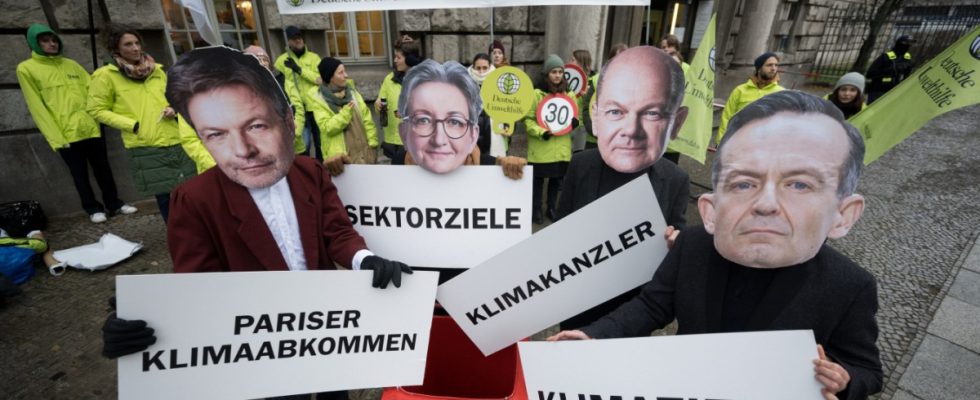The federal government has to accept its next setback in court, this time in climate protection. On Thursday, the Berlin-Brandenburg Higher Administrative Court upheld the lawsuits of two environmental associations that insisted on compliance with the German Climate Protection Act. The judges ruled that the federal government was obliged to use emergency programs to ensure compliance with the legally specified climate targets. Environmentalists applauded the verdict. The federal government can still appeal against it.
The German Environmental Aid and the Association for the Environment and Nature Conservation BUND had sued. They are calling on the federal government to issue so-called emergency programs, as provided for in the Climate Protection Act – namely if the climate targets are violated in a sector. In 2021 and 2022 this was the case in the areas of transport and buildings. For 2021, the responsible ministries, i.e. the Ministry of Construction and the Ministry of Transport, also presented a draft for an immediate program. But the Council of Experts on Climate Issues, which was commissioned by the federal government to examine the programs, found them to be inadequate. After that, they were never improved – they were simply not decided. The court has now declared this approach inadmissible. “The federal government must now take action,” said BUND boss Antje von Broock after the verdict was announced. “Climate targets are non-negotiable, they must be adhered to.”
The court considers the immediate programs to be inadequate
The verdict is embarrassing for the coalition, which also came into power with climate protection promises. She had argued that a “climate protection program” enacted in October fulfilled the purpose of the emergency programs. The Berlin Senate rejected this. “Immediate programs serve for quick readjustment,” the judges ruled. In contrast, the climate protection program is designed for the medium and long term.
The federal government can appeal the judgment to the Federal Administrative Court, in which case nothing would happen. The decision was “taken note of,” the lead climate protection ministry said on Thursday. As soon as the reasons are available, further action will be examined. If the federal government forgoes a revision, it would have to quickly present emergency programs for buildings and transport. “In the transport sector, it is obvious to introduce a speed limit,” said Environmental Aid Managing Director Barbara Metz. This costs little and quickly reduces emissions. In addition, environmentally harmful subsidies could be reduced. The federal government could then use the additional income to pay for a restructuring program. “The climate policy of the traffic light must be corrected,” demanded Metz.
The coalition wants to abolish the sector targets
Instead, the traffic light is currently working on correcting the Climate Protection Act: This will eliminate the sector targets – and with them the obligation to present immediate programs. Instead, progress in climate protection should be viewed across all areas. If the federal government were to revise and change the law beforehand, this could increase its chances of success. However, as things stand, the climate targets would still be missed. However, it is unclear when the amendment will pass the Bundestag. The first reading had already revealed major differences within the coalition. After the ruling, the Greens are now demanding special care. “We must not pass a law that provides fodder for lawsuits,” said climate politician Lisa Badum South German newspaper. “Legal certainty and closing the climate gap must be our top priority.”
The era of climate lawsuits may have only just begun with the verdict. Lawsuits against car manufacturers such as BMW, VW and Mercedes have so far been consistently dismissed; However, a final word from the Federal Court of Justice is still pending here. However, lawsuits that focus on the government’s responsibility are likely to be much more promising. In February, the Berlin Higher Administrative Court will again hear a lawsuit from Umwelthilfe, then about the climate protection program itself. It is also about preventing the problems from escalating, said Remo Klinger, the lawyer for Umwelthilfe. “The emissions gap will soon be so large that we would have to virtually ban traffic in 2028 and 2029 in order to achieve the targets.” Nobody wants this.
There is also a new constitutional complaint that also calls for emissions to be reduced. The plaintiffs therefore want to enforce compliance with legally binding goals in court. The Federal Constitutional Court has ostentatiously held back after its spectacular climate decision in 2021. But with the Karlsruhe principle of securing freedom for future generations, the court has a lever to once again hold the legislature accountable.

